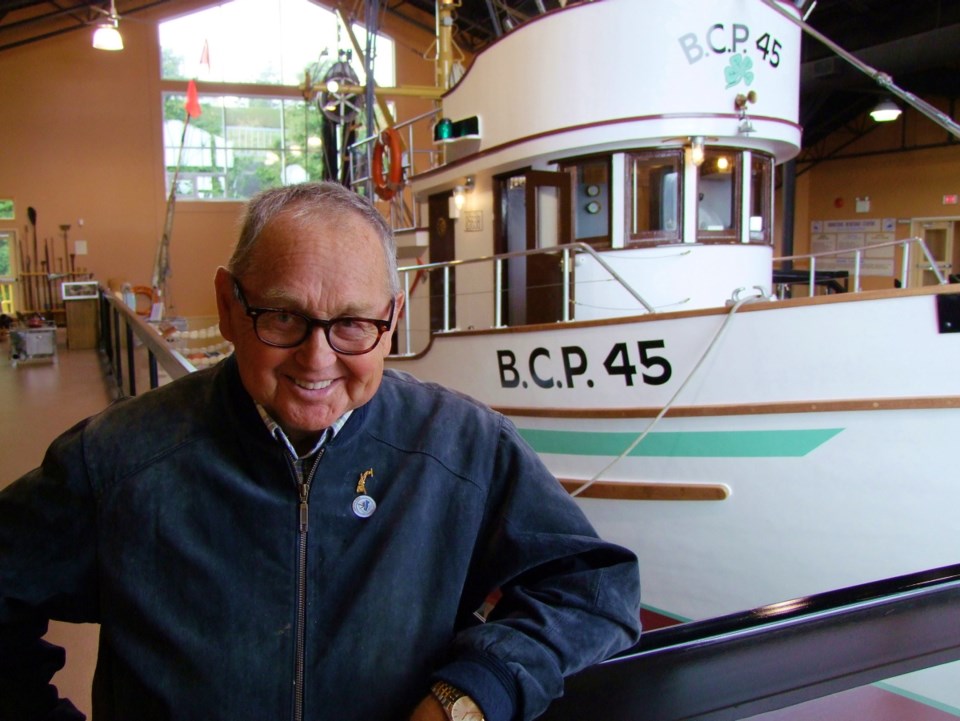 A recent column mentioned the Vancouver Island fishboat once depicted on the back of the $5 bill.
A recent column mentioned the Vancouver Island fishboat once depicted on the back of the $5 bill.
A couple of readers wrote in to point out that you can visit the vessel, now lovingly restored, in Campbell River’s Maritime Heritage Centre.
It’s also worth noting, a bit belatedly, the passing of a man who was key to getting it there. Ollie Chickite died Nov. 24 at age 78.
The banknote, in circulation from 1972 to 1986, showed fishermen taking salmon onto a seiner at Ripple Point near Seymour Narrows, north of Campbell River. The image was from a picture shot by documentary photographer George Hunter in 1958.
At the time, the BCP45 (a decidedly unromantic name) was owned by Quadra Island’s Harry Assu, who had bought it from B.C. Packers a decade earlier. His son Mel was the skipper.
Also among the six-member, all-aboriginal crew was Chickite, who had signed on as a cook at age 14 and worked on the vessel under Mel, his cousin, for 11 years. On the banknote, Chickite can be seen at the net table at the stern.
Assu sold the BCP45 a couple of years after the photo was taken. It then went through a succession of owners before B.C. Packers sold it to Chickite, its final captain, in 1983 (his down payment was reportedly $1; too bad it wasn’t a five).
Chickite’s friend Brian Kyle says B.C. Packers wanted to retire the boat but Ollie refused to leave the vessel, and fished it successfully for many more years.
It was Chickite who, having spent much of his life aboard the boat, brought it to Expo ’86, where it proved a popular attraction.
After another decade of fishing adventures (“some harrowing, and always memorable,” Kyle says), Chickite retired the BCP45 and turned it over to the Vancouver Maritime Museum as a piece of history. (“He left it as it was on its last day of work, clock stopped at 10 past four, jar of Taster’s Choice instant coffee in the galley,” said a story in the Province.)
Alas, the Vancouver museum didn’t have the resources to restore the boat, and it just sat in False Creek for six years, slowly deteriorating. So when Chickite learned of Rotary Club plans to build the Maritime Heritage Centre in Campbell River, he began pushing for the BCP45 to be part of the project.
“He was instrumental,” says Trish Whiteside, the centre’s operations manager. “He was like a dog with a bone.”
The BCP45 returned to Campbell River in 2002, where a half-dozen volunteers poured their hearts into its restoration. In 2005, the vessel, which had been built at Burrard drydocks in 1927, was designated a national historic site.
Why did it matter so much to Chickite? “He loved this boat,” Whiteside says. “He didn’t want to see it sink or go into disrepair.” Some saw it as the West Coast’s version of the Bluenose, the schooner on the dime. The BCP45 was emblematic of a way of life, a place and time, captured on a $5 bill.
We sometimes forget sometimes that there’s more to history than a dry-as-dust record of significant dates. One of the more entertaining bits on the maritime centre’s website is a story Chickite liked to tell about hiding some beer while packing for a trip (they didn’t want guys from other boats to help themselves) then forgetting where he stashed it — until he turned on the oven. “Not long afterward there was a tremendous explosion from the galley. Ollie went below to investigate and found glass all over the place. He returned to the deck with a red face. ‘Skipper, I found the beer!’ ”
That was the fun stuff, but life on the water could be pretty harsh, too. And rewarding. It got in the blood. Note that according to his obituary, Chickite had decided his remains should be “returned to the waters off Greensea Bay.”
They say Chickite was a good story-teller. So was Assu, the much-admired We Wai Kai chief whose recollections can be found in a book, Assu of Cape Mudge, that he co-authored with Joy Inglis.
Nice to see a piece of their history — our history — still preserved.



